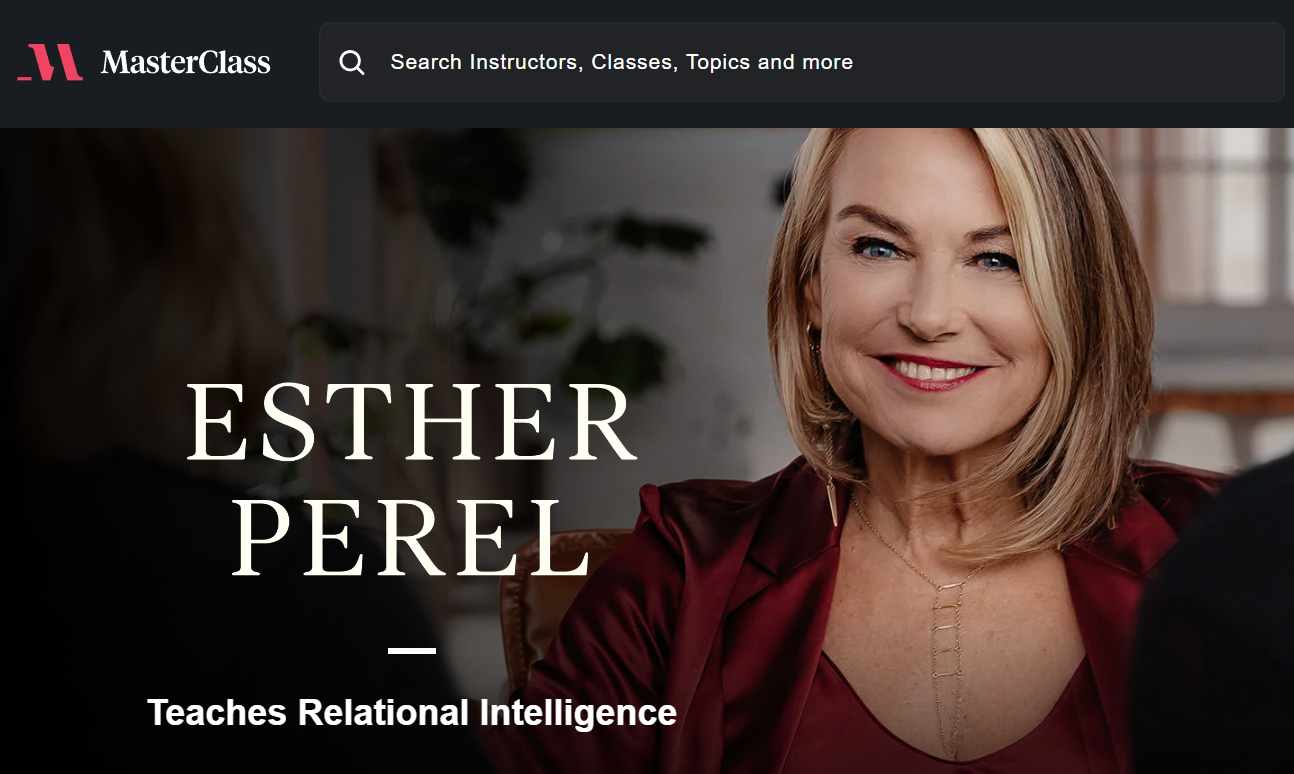- Home
- Think Pieces
- Interpersonal Dynamics
- Relational Intelligence
Relational Intelligence | What it is and Why It Matters
The quality of our relationships determines the quality of our lives. What is relational intelligence and why is it important? Let's discuss it...

We all have to interact with others on a daily basis.
And there's a certain type of intelligence that determines the success of your interactions...
It's called relational intelligence.
Let's discuss what relational intelligence is and why it's an area of personal development that we should all pay attention to.
This post may contain affiliate links. Please read my disclosure for more information.
What is Relational Intelligence?
Relational intelligence is the set of skills we use to navigate our relationships and connect with others.
I first discovered the concept of relational intelligence when I watched Esther Perel's Masterclass on Relational Intelligence, which I highly recommend.
In this Masterclass, Renowned psychotherapist Esther Perel teaches you the power—and the art—of connecting with others.
Many people are familiar with the concept of emotional intelligence.
What's the difference between emotional intelligence and relational intelligence?
Emotional intelligence is a component of relational intelligence.
However, compared to emotional intelligence, relationship intelligence focuses on a systemic approach.
Relational intelligence relates to the human capacity to connect with others specifically within familial, societal, and cultural systems.
As you develop your relational intelligence, your ability to deeply understand your dynamics with others will increase - and so will the opportunity to navigate them more effectively.
In this article, I'm going to cover three aspects of relational intelligence I found very interesting from watching Esther Perel's Masterclass.
I think they help to expand on the explanation of what relational intelligence is.
Three Aspects of Relational Intelligence
Establishing Boundaries
Sometimes there is a misconception that if people have boundaries, it prevents them from connecting.
However, it is because we have boundaries that we gain a sense of how to connect with each other.
Just as skin covers the human body, boundaries are the "skin" that envelops relationships.
In Esther Perel's MasterClass on Relational Intelligence, she talks about 3 kinds of boundaries:
Rigid Boundaries
In relationships:
A rigid boundary in a relationship cannot bend. At best, it divides; at worst, it breaks. Relationships with rigid boundaries struggle to allow outsiders in or out; they enable people to be self-directed but also disconnected.
Individual:
If you have a rigid personal boundary, you are walled off. You keep others at a distance—or cut them off completely. You lean toward staunch self-reliance, you push back at input from others, and you are reluctant to ask for help.
Permeable Boundaries
In relationships:
When a relationship has a permeable boundary, whatever happens to one person triggers a reaction in the other.
One partner may take too much responsibility for the emotions and the actions of the other; alternatively, when one person feels something, they expect the other to do something about it.
You can sense a relationship like this might be forming if, for example, you begin having fights with your partner about how others perceive you as a couple.
Individual:
People with permeable boundaries can be severely affected by external circumstances and people. They might reveal too much about themselves to others, and their fear of rejection and dependence on outside opinions can lead to burnout.
Flexible Boundaries
In relationships:
Couples with flexible boundaries enjoy a balance between independence and connectedness. Individual growth is encouraged, not obstructed, and stimuli from outside the relationship—like other relationships or opinions—are considered and, if the couple deems it appropriate, allowed in.
Individual:
People with flexible boundaries choose what to let in and what to reject. As a result, they are more likely to remain mentally and emotionally stable, even in trying circumstances.
Because of their level of comfort with themselves, they’re able to share personal information in a way that’s situationally appropriate, refraining from over- or under-sharing.
Understanding and Resolving Conflict
What's the most juicy topic when discussing relationships?
Conflict.
Although conflict often seems like a negative word, a certain amount of conflict is essential to the well-being of a couple or group.
The key to healthy conflict is understanding what you’re really fighting about—identifying the essential and frequently unspoken hurt that lies beneath the conflict.
In the MasterClass on Relational Intelligence, Esther Perel explains how, underlying conflict, there often are three hidden agendas: power, trust, and value.
Power
Fights rooted in power issues tend to be about which participant's priorities matter most.
According to the book Fighting for Your Marriage, by American psychology professor Howard Markman, in many relationships, the person who says “no” has the power.
The same goes for someone who withdraws from serious conversations about the relationship.
Other experts claim that the person who cares the least in a relationship—or who is the most adept at feigning indifference—exerts the most power.
Trust
Fights rooted in trust issues tend to be about closeness and connection: Who has my back? Can I rely on you?
Many marriage therapists believe that closeness and connection are related to how well a couple argues: When both partners agree to fight fair—by staying calm, focused, and receptive—conflict can actually deepen their connection.
Value
Fights rooted in trust issues tend to be about respect and recognition.
At work, people want to feel affirmed for their individual contributions, and they can feel hurt when those contributions go unacknowledged.
Likewise, successful marriages require a baseline of mutual validation in order to function properly.
Without these crucial ingredients, fights can easily turn ugly, with one or both parties trying to insist upon their own basic legitimacy.
Example:
Let's take the example of a common conflict situation, one person is upset that another person came back late.
On the surface, it may seem that the issue is just about coming back late.
But if you dive deeper and ask one party what upset them about the other's lateness, you may get 3 different responses:
- "It's the fact that they always get to do what they want."
- "It's the fact that they told me that they would be here at 7:00pm and I can't trust them."
- "It's the fact that I was here with the food prepared, and it felt like there is no recognition for my contribution."
Can you see the three hidden agendas at play here?
Response 1 is about power.
Response 2 is about trust.
Response 3 is about value.
Beneath each of these 3 agendas - power, trust, and value - lies a single, terminal layer: the need to feel that we matter.

Having Difficult Conversations
Another important aspect of relational intelligence is having difficult conversations.
Being alive means having difficult conversations, whether you’re a manager giving a mixed performance review or a romantic partner bringing the relationship to an end.
The first thing Esther Perels says about difficult conversations is to expect awkwardness.
Criticism can sting, or it can leave a permanent mark; either way, it tends to take you out of your comfort zone.
And just as you have the right to speak your truth, your conversational counterpoint has the right to say, “Wow, this is painful, or “This is intense,” or “This is unexpected,” or “This is hard to swallow.”
If it’s hard for you to say, it will likely be difficult for them to hear.
When you begin a difficult conversation, you should aim to start with the positive.
At the outset of the conversation, consider telling the other person everything you’ve loved about working or otherwise spending time with them.
Yes, they will likely be waiting for the other shoe to drop, but starting with the positive can create the context for yourself and the other person to listen more openly to what comes next.
To soften the blow, you can actually express to the other party that you know what it feels to be in their position.
You can explain that this is uncomfortable for you as well, and that you’ve been on the other side of the table, absorbing someone else’s difficult feedback.
Another aspect of Esther Perel's MasterClass that I really enjoyed was her comments on reflective listening.
It's actually very effective to do reflective listening at the moment when listening is the moment challenging.
It involves very simple prompts, such as:
"What I'm hearing you say is...."
"Did I get that right?"
"Is there more?"
Reflective listening is especially important when someone says something you don't agree with. Even if you don't agree, you want to make sure you've given them the chance to fully express their thoughts.
Reflective listening helps validate the other person's experience. Validating someone's experience doesn't rob you of your point of view, nor does it mean you agree.
It just makes room for both of you in the conversation.
After all, you want a conversation, not a debate!
Final Thoughts
So, those are some valuable insights I discovered by taking Esther Perel's MasterClass on Relational Intelligence.
I found the class very interesting, because it made me reflect on a few experiences and situations in my own life.
In conclusion, relational intelligence is an important skill that all of us should develop.
Today we have discussed how establishing healthy boundaries, understanding and resolving conflict, and having difficult conversations are important aspects of relational intelligence.
These are key aspects, but there's much more to it, which we all discover as we navigate the full gamut of interpersonal interactions.
Thanks for reading!
Thanks for reading! If you liked this content, share with a friend:
Recent Articles
-
The Best Python Courses Online
Apr 11, 25 10:19 PM
Here are the best python courses online to help you learn python programming and and practice your new skills through hand-ons projects and exercises. -
What I Wish I Knew About the Duality of Life
Mar 30, 25 06:06 PM
Good and bad, light and darkness, highs and lows - these are all elements of a rich, rewarding existence. Here's what I wish I knew about the duality of life. -
The Best Video Editing Courses Online
Mar 27, 25 12:14 PM
Here are the best video editing courses to help you advance from beginner to pro and create high-quality videos.
Your second block of text...


























